#these days i just draw things from One game and its Not yume nikki
Text
a place between unreality and lucidity, or understanding the intentions of Chapter 12
CONTENT WARNING: DISCUSSIONS OF DEATH, SUICIDE, AND ABUSE. I ALSO TALK A LOT ABOUT LUCID DREAMING, WHICH CAN BE DISSOCIATIVE FOR READERS, SO PLEASE TAKE CARE OF YOURSELF.
SPOILER WARNING: REFERENCED YUME NIKKI AND OMORI SPOILERS, AND OBVIOUSLY, DREAMSCAPE SPOILERS.
We're back bois, and we're back with my favourite chapter.
I love Chapter 12 so much, the same way I adore the Truth Sequence in Omori. Originally I was going to compare the two, but I realised there's little overlap other than the intentions they're written with.
...so I wrote about the intentions instead. The little bitch boy intentions. You'll see what I mean.
Buckle up, this one takes some insane turns. I had wild epiphanies while churning all this out in a couple hours. I think I may be losing my mind.
understanding what I mean by "lucidity", and discussing dreams as plot devices
Lucidity is a very particular type of plot device that I find difficult to describe - it is a specific type of fragmented narrative that fragments location, exploring an impossibility that often has links to deeper meaning. Typically it is an abstract way of foreshadowing or revealing something to the reader, and it mirrors the concept of a "liminal space".
Dreams in texts have been used as a method of foreshadowing for hundreds of years. While the human brain has no ability to predict the future, but only reframe the past, the uncontrollable fragments of memory that are spat back out at you during unconsciousness have captured human fascination since we first started sleeping.
Dreamscape itself isn't a dream, but it is a different form of consciousness, and the creator has stated that Chapter 12 draws a lot from lucid dreaming, which suggests this counts as part of the 'Lucidity' narrative trope. As someone who does not dream much, I find this shit fascinating. Like I'm sure it's horrific as hell but. It seems so fucking cool.
Perhaps some of the best examples of the use of lucid dreaming to form narrative are Yume Nikki and its fangames, as well as Omori. Yume Nikki was a catalyst for the creation of many RPG maker horror games, and it's an excellent piece of work. No concrete story, just wandering an endless abyss of Madotsuki's mind, observing the horrors within it. The fangames branched off this concept (I personally recommend .flow ) and added more aspects, but never being concrete about the trauma.
Things are illogical in the Yume Nikki dreamverse, but they don't have to be logical, and things don't have to make sense to the player - it is purely up for speculation. At the same time, we know it has to mean something. There's an innate sense of exploration and meaning in dreams, despite the real life version often being meaningless bullshit.
This is where Omori explicitly diverts - it outright states what happened on the Recital day, in a short, distorted sequence known ominously as "The Truth". While the entire game is about lucid dreaming, this section captures the horror due to the illogical nature of it, where Sunny travels from his living room, to a hospital, to stairs, his bedroom, backstage... things are wrong. At the same time, the player is focused on completing the album and collecting the polaroids, with the confusing nature of the locations building to the horror of the final moment.
Despite all this, none of these sequences are the big moment, or even nearing the climax.
Yume Nikki doesn't have a big moment, unless you see the ending as significant enough for that title. It is a game about wandering unreality, and without a plot, it can't have a climax. It uses lucidity to provide a sense of narrative, even when there isn't one, tricking the player into trying to comprehend an impossible universe.
Omori is not building up to that that one sequence, but rather, it is a stepping stone leading to the Final Duet, which is the true climax of the game. It's an emotional release for Sunny and the player, a sense of finality in a game without a proper "ending". The Truth sequence is merely a way for the player to understand plot and build horror, and without the Truth's photo album... we would understand nothing at all. An impossible universe.
This leads to my big theory...
the purpose of chapter 12 - you can't understand it
Chapter 12 is a lying piece of shit and won't admit to us more than cookie crumbs about the future of the Dreamscape universe. And I still love it. And here's why.
Due to the abstract nature of it, we can't understand it. Perhaps Sunny can, to some extent, but since we're not sure the cause nor purpose for it, we can't understand it. We can speculate, but we can't understand. Just like Yume Nikki, we might never properly understand what each segment means.
Here's some little nuggets I've been scrambling through for information.
The beginning talks about time and distortion of it, which mimics some of the issues with time Sunny has in real life. This may be foreshadowing his eviction or declining physical state.
Body horror is incredibly prevalent, particularly self-mutilation. This has several implications, but it likely hints to Sunny's feelings for himself. It may also foreshadow what Mari looked like during the Recital day scene, which I'm starting to realise hasn't actually been shown yet. Interesting.
While this is one of the first times we see Mari as more than a virus or a corpse in the text, it's also completely distorted by Sunny's unreliable narration. Despite the slightly manipulative conversation held between them, Sunny is completely frozen in grief, desperate to beg for her forgiveness.
Sunny sits there with her pain in that hospital, insisting he deserves it. It hints further to Sunny's declining mental state, but that doesn't tell us anything more than his own self-loathing. Both this and the above point foreshadow Mari's potentially abusive nature.
Sunny is completely determined to stay within the lucid dream, and is also very insistent that Mari is somewhere at the end, which turns out to be right. How he knows this is not shown to the reader.
Segments of this are related to Mari's own memory, which provides us with a better understand of the VHS system, and of the accident that lead to her suicide.
The lucid dream is a representation of Sunny's unending trauma through what he perceives to be Mari's eyes, perhaps even a representation of what he feels he needs to do for her forgiveness.
We also learn a bit more about Pianoboy, who we know is a clone of Sunny, and he specifically highlights a connected feeling of isolation. At the same time, it has to go further than that, but we're again limited by understanding. There's more, but not enough to guess what 'more' means.
But those tidbits mean nothing. And I can't do much more than spew nonsense about segments, with no ultimate conclusion.
Because Chapter 12 is not designed to be understood, but rather, it's something to look back on when you finally do understand. It's foreshadowing in its most complex form, hinting ominously to what you don't understand. It is also similar to Black Space in this way - no-one can figure out the truth of the Recital Day from Black Space alone.
I could spend hours trying to understand every symbol, every room, the essence of Chapter 12 itself, and fuck me because i totally would but ultimately, it's all fragments of a deeper narrative, more complex than our limited understanding.
And it's a horrible, horrible thing to do to a reader. An unanswerable segment, dangling understanding right in front of their nose, but making it unreachable. Haunting them with the human desire to see patterns in chaos. What utter cruelty. How could you do this to me, @omoriboii. Why would you do this to me, the analysis God, with the most overthink-y brain in existence, and yet give me, ultimately, nothing to lead to. Why leave me a crumb to look back on, something I can never understand with the information I hold. I may be stupid, but I can understand when I am beat.
It's perfection.
why even torture someone with the inability to understand?
Building horror is incredibly difficult, because it's so easy to do foreshadowing incredibly wrong. We've all seen horror movies that are so bad they're funny, relying entirely on petty jumpscares, terrible props and showing off the killer way too fast-
Wait a minute. Showing off the killer too fast ruins everything? Dammit, I wanted to flex my big sharp knife. That's right guys. I'm the serial killer of this blog. ?????
Anyway, demonstrating the inability to understand something to the reader is a common feeling that gets the emotional brain hooked and the cogs whirring in the logical segments. You need to understand. You develop theories, you discuss them with others, seeking evidence, only to find something that changes your view, ruining everything, forcing you to start again. Being teased is fun. I am kinky
That's my favourite feeling of all time. It's why I spent hours searching for that again after I played Omori. I still remember my first theories of the truth of the game, right up until the one I had just before I discovered the real Truth. Even after that, there was more for me to analyse. Analysis. I love analysis. Yk?
I love a good challenge, and analysing these segments are so much of a challenge that I actually can't do it, which is why I get so hyped over it. Why do I do this to myself?
I actually don't really know how to end this, but I think you get my point. It's fun. I like it. I love suffering. uhh. dreams cool.
new bit: song i wrote this listening to.
today's song, the main title theme from Tomorrow Won't Come for those without.
youtube
i needed a reminder of what horrible liminality feels like, and that goddamn game does it better than anyone. i love it so much. thanks, etherane, your games cursed me with a sick desire for unreality.
special thanks to all the games who ever bullied me for having boring ass dreams.
#i wrote all this on copious amounts of caffeine#dreamscape au#omori dreamscape au#omori au#dreamscape#lucid dreams#sentience's stuff#i'm such a nightmare in this LMAOOO#i've written my own little chapter 12 lucidity within my analysis of chapter 12#what have i become#omori fanfic#im a fucking mess#i think i lost my mind here#Youtube
10 notes
·
View notes
Note
Howdy! Miss you, and Idk if you still use this blog but i figured I'd leave you a little message regardless. Hope you are doing well!
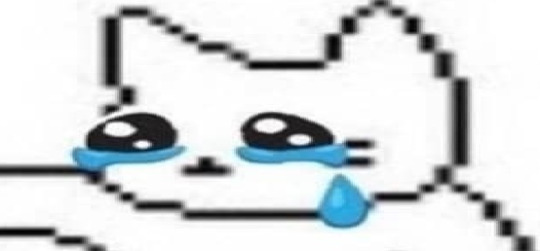
FJSDLFSKDLS HI thank you,, it makes me really happy to hear this :`(
sorry i dont post here anymore i just dont draw anything that i feel confident enough to post here. yet
#ask#friskdreemurr00#im still on tumblr everyday but i lurk now#im working on it tho#these days i just draw things from One game and its Not yume nikki#maybe ill let myself be cringe here#that would be cool#anyway god bless your soul i will do my best to provide some content soon#<3
16 notes
·
View notes
Text
INTERVIEW: After 13 Years, Indie RPG Masterpiece Ruina is Finally Available in English

All screenshots of Ruina: Fairy Tale of the Forgotten Ruins taken by author
This article was made possible through the invaluable contributions of translators Dink and bool, and further aided by context generously provided by writer, translator, and RPG Maker scene dweller Kastel (@kastelwrites). Sections from their answers were excerpted for this piece and edited for clarity and content.
Last year, at the start of the pandemic, a lapsed member of the RPG Maker community known as Dink stumbled across a screenshot while trawling Japanese free game websites: a black obelisk standing in the midst of ruins. “This is going to make me sound like I've been huffing paint, but this image spoke to something quite visceral for me — like I'd been waiting to find this game. Something about the sepia tones, the light and shadows, the elegance of its very archetype. I knew I had to play it.” Dink had stumbled across Ruina: Haitou no Monogatari (Fairy Tale of the Forgotten Ruins), one of the most acclaimed free RPGs ever made in Japan. Released in the antiquated RPG Maker 2000 engine in 2008 by developer Shoukichi Karekusa, it retains a strong cult following and has even been translated into Chinese. Yet unlike its RPG Maker siblings Yume Nikki and Ib, Ruina is practically unknown in English-speaking countries. Dink decided to change that. “Once I realized that it had yet to be translated into English,” he said, “it was like I’d become possessed.”
Ruina is unique. A role-playing game that takes direct influence from tabletop games and gamebooks, it boldly defies conventions established by classic console role-playing games like Dragon Quest and Final Fantasy. Rather than controlling the main character across a top-down map, the player slowly uncovers a hand-illustrated map of nodes. Survival in the dungeon requires the use of ropes, pickaxes, and oil for your lantern, resources that are all expendable. Your party members are valuable not only for their combat skills but for their out-of-combat abilities: thieving, sneaking, even swimming. Most of all, Ruina allows for choice and consequence, a phenomenon far more common in western RPGs than Japanese RPGs. Say you stumble across treasure in a dungeon, but are ambushed by thieves who want the treasure for themselves. Do you give the treasure to the thieves? Stand your ground? Or attack the thieves before they can do the same to you? Since your ability to save in the dungeon is heavily rationed, you may find yourself having to choose between restarting a save or living with the messy outcomes of your choices.
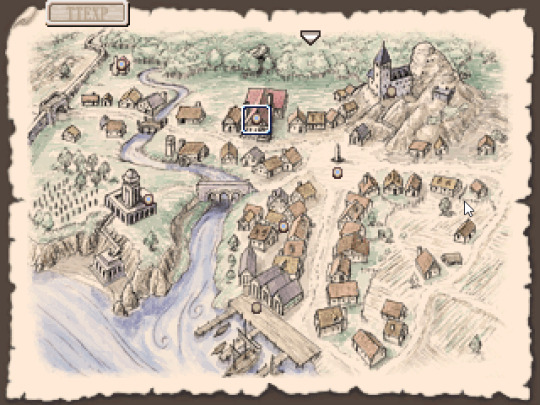
There’s something to Ruina that grounds it in the Japanese RPG tradition, rather than a straightforward riff on Wizardry or Might & Magic. Those earlier games gave you several choices as to building your party, but little in the way of story or character. Ruina is a far more curated experience. On starting the game, you’re offered four “backgrounds” that align you with certain other characters, just one year before Dragon Age: Origins would pull a similar trick. Rather than being given the full freedom to explore a sprawling world, your options are limited to navigating a single, contained dungeon. The characters available to be recruited into your party have defined personalities and quirks — some are already good friends of yours, others are insufferable, and still others have significant flaws that speak to the kind of person they are versus their gameplay function. These are NPCs out of the Baldur’s Gate school, given the illusion of life, rather than the team of personalized murderers you’d recruit in an Etrian Odyssey game.
Very little else in the Japanese games scene is like Ruina. You could draw comparisons with games like Unlimited Saga and Scarlet Grace, representing the legacy of controversial SQUARE ENIX auteur Akitoshi Kawazu. You could similarly connect Ruina with Yasumi Matsuda’s experimental Crimson Shroud, which takes influence from tabletop to the point that it has the player rolling dice in-game. But Ruina is more accessible and polished than a Kawazu game, and far more fleshed out than Crimson Shroud. Even Etrian Odyssey, with its comparatively barebones story and characters, doesn’t quite compare. Ruina stands alone in the Japanese free games community, a legendary title that people respect but don’t fully understand how to replicate.

A few days ago I reached out to Kastel, an academic, writer, and translator who is very familiar with Japan’s RPG Maker scene, about where Ruina fit in Japan’s wider field of indie games. “I know many people in the furige (free game) scene who love the game to death,” they said. “But they also found it to be a hard sell due to its unique, almost western take on the scene. The fact that the game is even this popular speaks to something.” Despite its crunchy mechanics and niche inspirations, the game is popular enough to have spawned light novels, an honor not unique to it (other RPG Maker games have accomplished the same) but certainly significant. Kastel drew a comparison between Ruina and Darkest Dungeon, another weird and uncompromising game that draws from both Japanese and western RPGs. “Ruina is sorta different from everything, but you also see dungeon crawlers get inspired by it,” they said. “Not all games take direct inspiration, but you can’t help but see a little bit of Ruina here and there.”
So why did it take so long for anybody to translate Ruina? Dink isn’t the only person to try his hand at translating it into English; just last fall, another forum dweller placed an ad recruiting a translation team to tackle the game. The unfortunate reality is that translating text within the RPG Maker engine into English requires intensive and repetitive labor. “There’ve been tools developed by vgperson [a prominent translator of RPG Maker games] for RPG Maker 2000 and some other machine translation tools for newer games, but they all remain difficult to use for translators,” Kastel says. “The way games are scripted uses events inside the map and developers rarely name them. So not only do you need to edit it via the appropriate RPG Maker engine, but you also need to go through each event contextless unless the creator actually notes things down.” So, the enterprising Ruina translator doesn’t just need to translate all the text in the game into English. It isn’t even a question of whether or not to manually edit the game’s many pictures and custom menus into English by hand. It’s the sheer difficulty of navigating between thousands of (often poorly labeled) events and variables in the RPG Maker engine, ensuring not to introduce any new bugs or errors in the process, while also finding the time to do all of the above.

Dink was assisted by a friend of his named bool, who played through the game alongside the translation process and gave invaluable advice and fixes. “Uncovering the mystery in the game's story sort of ran parallel with the translation of the game itself,” bool says. “As the story progressed, the characters would decipher and learn more about the lore of the eponymous ruins within the game, and as the translation progressed, the same held true for us. It really captivated me to be a part of this process, and I started to look forward to each new area that I could explore and each new morsel of the story I could understand.”
Without bool’s efforts, it might have taken far longer to put together something workable. As it was, it took four exhausting months. “I worked long hours — 12+ hours a day, 6, sometimes 7 days a week on top of my day job — and very rarely used my free time on anything else,” Dink says. “I did manually input the text in RPG Maker 2000, which has raised some eyebrows because there are some very nice tools available for game translation that would have saved me a lot of time. However, a huge advantage of working directly in the editor is being able to see the game more or less as it appears to players. A Notepad file streamlines the basic translation process, but it also heavily obscures context, whereas the editor allows you to see what switches and variables are being used, what music is being played, and sometimes even helpful creator comments, all in the same relative order you'd experience it from within the game.” Dink had one more secret weapon up his sleeve: the experience of working with the RPG Maker engine as an adolescent. RPG Maker has a reputation of being a tool designed to churn out Dragon Quest clones with ease; but nobody knows the intense difficulty of forcing the engine to do something, anything, like a former RPG Maker developer does.

The English version of Ruina, as it currently exists, is a workable but inevitably compromised version of the game. Running the game requires installing the Japanese RTP pack of visual and audio resources for RPG Maker to function, along with the use of the EasyRPG player to provide English-language player name entry. There’s the matter of the custom menus, as well. Several of the menus have been replaced with functional English equivalents, but by Dink's own admission they could use an expert's attention to better compare to the original. Other pictures, such as place name displays, have yet to be replaced by English-language equivalents at all. And the strict character limits of RPG Maker 2000 led to some creative truncating when translating from Japanese to English, especially with item and skill descriptions.
But the existence of an English-language Ruina, one that renders the whole game playable from beginning to end with a readable script, is a miracle. Speaking for myself, I started the long process of learning Japanese two years ago in part so that I could one day play this game, never expecting there might one day be an alternative. Others in the Japanese RPG Maker scene, knowing the brutal difficulty of translating a game made in the earlier engines, were shocked that a game of Ruina’s complexity and length was successfully translated at all. Speaking for themselves, Dink and bool insist that their own story doesn’t matter much. What matters is the quality of the original game and the hard work developer Shoukichi Karekusa put into its creation. Anything else is an addendum, another version of the game that — while it cannot ever be the original — might at least make something resembling that original experience accessible to others.
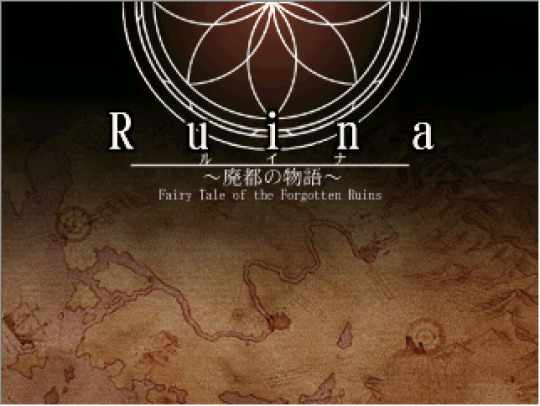
Frankly speaking, I think there’s something to that. The “true” version of Ruina will always exist in its original form, released for free by Karekusa in 2008. It stands as the defining work of a creator who sought to create a unique experience combining the appeal of console and tabletop roleplaying games, with no concessions to market sensibilities. A creator who not only released their baby on the internet for free, but insisted that a game like Ruina must always and ever be free. An austere monolith, it stands side by side with Yume Nikki, Ib, and even Cave Story as one of the great works to come out of Japan’s independent scene. Now any English speaker can pick up and play this new version of Ruina, and learn what that monolith is and where it leads to.
You can download the English translation of Ruina here. For those who want to learn more about the Japanese RPG Maker scene, I recommend checking out Kastel’s page here.
Are you a Ruina fan? Let us know in the comments!

Adam W is a Features Writer at Crunchyroll. When he is not working through exercises in Wanikani, he sporadically contributes with a loose group of friends to a blog called Isn't it Electrifying? You can find him on Twitter at:@wendeego
Do you love writing? Do you love anime? If you have an idea for a feature, pitch it to Crunchyroll Features!
By: Adam Wescott
4 notes
·
View notes
Text
Yume 2kki and Memories part i: Wataru, Nostalgia, Decay

Maybe it would be smarter to make the first post about Yume Nikki itself instead of a fan game, and while I absolutely adore the original, this one part of Yume 2kki is on my mind so frequently that while thinking of game topics to talk about, it had to be the first thing on the list.
For anyone who doesn’t know, Yume Nikki is an rpgmaker game about exploring the dreams of a girl stuck in her room. You can’t do much in the waking world, but falling asleep allows you access to Madotsuki’s subconscious, and its a surreal and creepy character study of what dreams show you about the dreamer.��
This game spawned a ton of fan games, focusing on different protagonists with entirely new dreamworlds to explore. The most vast of these fan games is Yume 2kki, a multi-creator project by 2chan. Many different creators contribute their own dreamworlds, creating a massive dreamworld spanning so many different vibes and art styles. While lacking one concise direction or story, like most of the other fan games, most creators have a distinct feel to their areas. Instead of reading deep into one subconscious as in the original, 2kki feels more like dipping into some sort of collective subconscious and finding pockets that speak to you.

Different parts of the game have entirely different feelings, and many creators seem to be telling their own stories. There are a few very different locations in the game that really resonate with me, however, and so it felt fitting to talk about different segments of this game in different posts.
The first 2kki creator I want to talk about is my absolute favorite, Wataru. They’re credited with 32 maps on the Yume 2kki wiki, all of which have the same themes: abandonment, nostalgia, and decay. Their worlds are full of beautiful antique architecture, overgrown Victorian gardens, and a blend of mechanical and organic elements.
I love liminal spaces. My relationship to the liminal is one of the most important overarching themes in my life. Exploring and illuminating the discomfort that comes with ambivalence, and transforming it into something positive, is part of what I would consider as my life’s work. And Wataru’s worlds are FULL of liminal spaces, so it seems natural I would gravitate so strongly to them. Really, all of these exploration type games are full of liminal spaces by nature, but the bridges, tunnels, boats, and train tracks in Wataru’s work stand out to me especially.

The biggest theme, however, in this area of the game is the passage of time, and looking back on the past. Most of the areas are familiar, everyday places, with an overlay of grime, decay, damage, and overgrowth. Returning to a beloved place and finding it unfamiliar now, and nothing like how you left it, is a right of passage on every journey, demonstrating how much you yourself have changed as well.
Wataru’s worlds form a mostly complete chain, starting with full detailed towns and apartment complexes, and gradually decaying to more symbolic areas, such as the Cosmic World (a mishmash of Wataru’s other assets with a neon flashing color scheme), or the Square Ruins (made up of many different architectural elements combined nonsensically into one maze-like area). The end of this journey is the Depths, a serene area deep underwater. The sea commonly represents the subconscious, or what “lies below the surface”, but that’s a story for another day.
Our dreams draw heavily on memories, and, in the mind’s sleepy attempt to make sense of complicated issues, draw on familiar things, people, and spaces to make sense of our cognitions. This code of symbols ends up a little different for everyone, based on our differences in experience, but a lot is based in common cultural experience as well (this is how the symbolism in a tarot deck works, by drawing on archetypes and themes common throughout culture, to create a universally understood representation of a concept!). While dreams are very customized to the dreamer, in a work of fiction, I think it’s reasonable to use the more general interpretations of symbols to try and figure out what is being communicated.

In the waking world, one tends to look back on fondly remembered places of the past with rose-colored glasses. Going back to revisit memories from childhood and finding out how much they, and you, have diverged from that last collective memory is one of the most powerful indicators of the passage of time we can experience. For me, the version of myself that I was at a certain point is very deeply entwined with my environment, and seeing that environment broken down, overgrown, shut down, or damaged is always shocking, because I know that much change is mirrored in myself as well, just not surface visible in the way it is on an old house.
If different aspects of ourselves “live” in different memories of physical spaces, dreaming of those spaces in this decrepit state is symbolic of an abandonment of those states, those goals or aspects of our personality that were so significant during each point. As the maps themselves decay from clear and complete areas to messier, illogical worlds, it’s as if we travel deeper into memories, to places and events more forgotten. And then, the journey ends in the Depths of the subconscious.
This symbolism makes complete sense to me, as someone who spends a lot of time thinking about my place in time and space. This interpretation makes Wataru’s worlds feel so much like a real dream to me, with a linear progression and overarching theme.

Or maybe I just like it because of the swan boats. I really love swan boats.
#yume 2kki#yume 2kki theory#holy crap this is an infodump no one needed#yume nikki#yume nikki theory#i love symbols#rpgmaker
36 notes
·
View notes
Photo
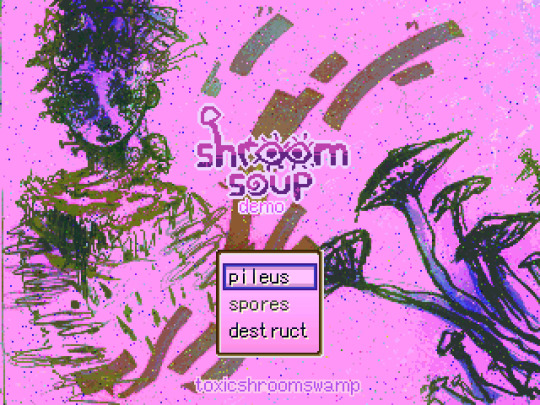
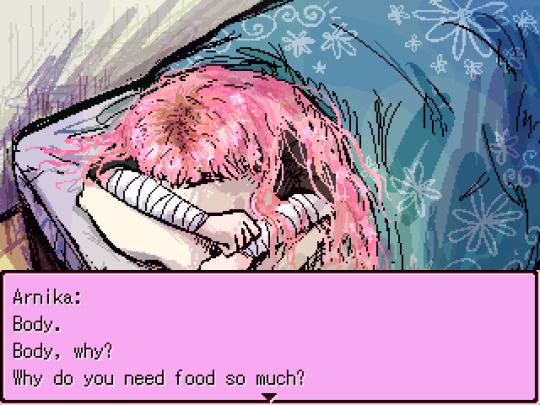

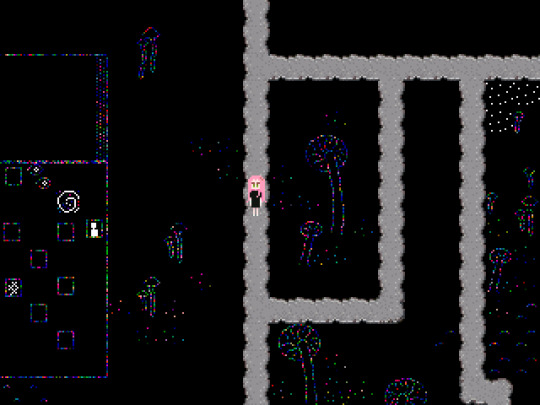
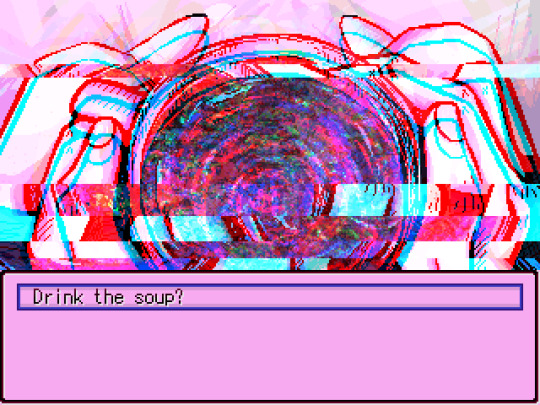
August’s Featured Game: Shroom Soup
DEVELOPER(S): Shroomy
ENGINE: RPGMaker 2000
GENRE: Adventure, RPG, Psychological Horror
WARNINGS: listed here (may contain spoilers)
SUMMARY: You play as Arnika, a gloomy teenage girl. Perpetually tired, you live off excessive sleep, lime juice, and instant soup.
You look into the vortex forming in your cup of said soup, this time mushroom flavour. Next thing you know, you are in an entirely different world where everything, from buildings to people, is being devoured by fungi.
It seems like you have no choice but to walk on... Your journey involves exploration, puzzle-solving and battles.
Download the demo here!
Our Interview With The Dev Team Below The Cut!
Introduce yourself!
Hello! I am Shroomy, and I still haven't figured out which one of my nicknames I should go by, but I use "uboaappears" for art and "toxic shroom swamp" for games. I have a bachelor's degree in biology since two weeks ago and like everything surreal, gory and gay. Nice to meet you.
I have been in the community since about 2012, and that might be also when I first wanted to make a game - a Yume Nikki fangame, because YN brought me here. I messed around with the engine for a long time, and certain characters and ideas gradually mutated to whatever this is now.
What is your project about? What inspired you to create your game initially?
*Shroomy: It's about making a cup of instant soup and accidentally going on a very weird adventure.
...Okay, actually, it's a coming-of-age story with an emphasis on mental health, relationships, and toxic flesh-eating mushrooms.
The idea came to me when I made myself an instant soup once. For some reason, I thought it would be cool if there was a portal into another world in the cup. That's how it started.
(I was also into drawing mushrooms growing on people at the time, so that naturally made its way into my Awesome Game Idea.)
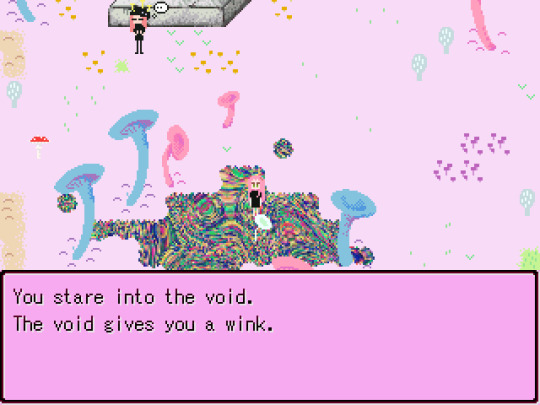
How long have you been working on your project?
*Shroomy: ...A while. It's enough to say that I graduated from both high school and university with it. But to be honest, I didn't really do much with it until about two years ago. Right now I tend to think of the time before that as trial and error, playing around with ideas and learning to use the engine.
I feel a little self-conscious about how long it took me to come up with a coherent story, but that might be a good thing. Since this is quite a personal game, it helped to grow as a person. I think it made for a more interesting and mature work than it would be otherwise.
Did any other games or media influence aspects of your project?
*Shroomy: I feel like I take little bits of inspirations from everything. But I'd say Yume Nikki and Re:Kinder were the biggest game influences. Maybe Hello Charlotte, too - the minimalistic world gave me some food for thought :>
Design-wise, I think my current (character) style is a lovechild of Danganronpa, Killing Stalking and something else I am not sure about. Maybe just me.
Have you come across any challenges during development? How have you overcome or worked around them?
*Shroomy: I think the biggest challenges for me have always been centered around the lack of free time, the lack of energy or the lack of motivation. Some people manage to juggle life and gamedev, but I get exhausted really easily, so it's hard. This is an ongoing issue.
I tend to try and free up a day just for relaxing and creative stuff. I've also started using the Forest app for focusing on things, and sometimes use it for gamedev as well.
At the beginning I found it frustrating that my skills (in pixel art, for example) didn't match what I wanted to create. That one was improved by - you guessed it - making a lot of pixel art. Making and scrapping a bunch of tilesets for the game. It's as simple as practice and learning how to get the most out of your art program. (It also helps me to make a detailed sketch of a map before I start working, or at least brainstorm the main elements of it.)
Another challenge was the incoherence of the story. Originally I wanted to make something really vague and open to interpretation, but... that actually didn't give me enough material to work with. In the end, I played around with the characters, tried to write them some backstories that no one was going to see, and somehow ended up with an actual plot..? Shocking, I know!
And the final thing is putting gameplay into the game. To be honest, the puzzles in the demo were pretty random on my side, I just thought them up on the spot. In subsequent locations I tried to make them relevant to the game's themes and/or hint towards the story.
Have any aspects of your project changed over time? How does your current project differ from your initial concept?
*Shroomy: For one thing, the current project has a story and a plan, even if the story is presented in quite an obfuscated way. The original concept was not much more than an idea of a shroomy world. The characters also have a lot more depth and pain to them than they used to. The locations have changed a lot as well, to the point where most of the original ones don't exist anymore.

What was your team like at the beginning? How did people join the team? If you don’t have a team, do you wish you had one or do you prefer working alone?
*Shroomy: My team is mostly just me. At the beginning it was a young and naive me, and now we have a slightly older and better-at-art me.
After I started my dev blog, I was contacted by Tommuel, who now helps me with sound design and music. And my old friend Robin has made a few NPC sprites for me, and might give a hand with more pixel art in the future.
They're not really involved with other aspects of development, but I really appreciate their help anyway! I prefer to keep most of this game to myself - it feels too personal to share, plus I'm a bit of a perfectionist.
What is the best part of developing the game?
*Shroomy: I would say it's putting my work out there and sharing it with the world. I'm also really proud of how much I've grown as an artist and writer through developing this. I got attached to this story and this world, with all of its fun, weird and sad details.
It's also been really fun, amazing even, to get to know other devs and make friends through being part of this interesting and creative community. I owe some wonderful friendships to it.
Do you find yourself playing other RPG Maker games to see what you can do with the engine, or do you prefer to do your own thing?
*Shroomy: I definitely play other games for inspiration, it helps me a lot. Though I try not to make things "just like" other games, but make it a transformative learning experience instead.
Which character in your game do you relate to the most and why? (Alternatively: Who is your favorite character and why?)
*Shroomy: I feel like I have been through stages. At first I was Arnika, then Lina, now I feel like I'm turning into Arthur. I guess I put my traits into all of them. (Does that mean that Bernard is the next stage? I'm /so/ ready to transcend humanity, finally learn how to do maths and become everyone's favourite character.)
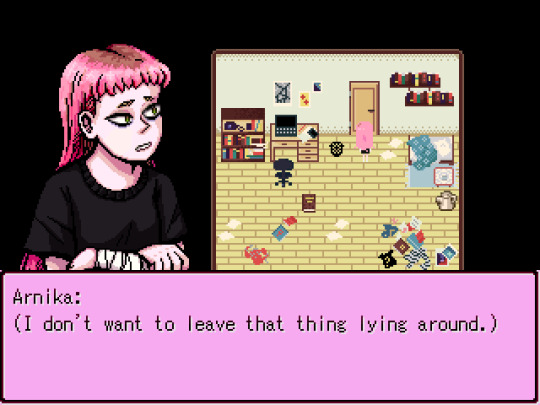
Looking back now, is there anything that regret/wish you had done differently?
*Shroomy: I think the biggest mistake I made was jumping straight into making a game without thinking it through or considering the scope. In the end, the lack of planning set me back a lot.
Admittedly, I was young and excitable, so I guess it was a learning experience? I didn't really know how to write stories or plan long-term projects, but over time, I somehow built up those skills. I think it's good to have a clear-ish idea of what you want to make before you start, and maybe start with something small. (So basically, do the opposite of what I did.)
Once you finish your project, do you plan to explore the game’s universe and characters further in subsequent projects, or leave it as-is?
*Shroomy: Aha. Actually, yes. I have accidentally started writing two sequels already. They will be small games focusing on other characters' perspectives (as opposed to Arnika). I'm not actually touching them yet though, only making some notes and writing scripts. Perhaps by the time the first game is released I'll have enough material to comfortably work on them.
What do you look most forward to upon/after release?
*Shroomy: Fan reaction, I think? To be honest, I'm not really sure. I think I'll just be enjoying the incredible dopamine rush after finally setting this child of mine free to explore the world and infect people's brains with all the shroomy memes it contains. (Also will probably get off the internet for about a week from the anxiety.) Then maybe being free to work on other things, indeed. And posting spoilery concept art >:D
Is there something you’re afraid of concerning the development or the release of your game?
*Shroomy: I am a little worried about the reception of the game's subject matter. If you looked at the list of warnings, you might have an idea what I mean. Sometimes it feels dangerous to explore certain themes in your stories, because people misinterpret depicting something bad as promoting it, for example.
But that's why that list exists. I'm just going to let people know straight away that I explore dark themes in this project and I'm not going to hold back on how I do it. Creativity should flow freely, I think.
(I am also a little worried about the ratio of my free time vs. gamedev time and /when/ I will finally be able to release it, but... Thankfully, I'm the one in charge of that.)
Do you have any advice for upcoming devs?
*Shroomy: Take some time to make a plan for your project, start small, fail faster, and aim for something finished before you aim for perfect. Make a system for organising your files. Back up often, and on a different drive/cloud than your game is on, preferably several. Most of all, make something you would love to play! And don't be too hard on yourself.
Question from last month's featured dev @blackcrystalsrpg: What are your game dev pet peeves??
*Shroomy: I dislike the fact that sometimes I want to have made a game more than I want to make a game, but to have made a game you need to go and make the game. ¯\_(ツ)_/¯ But there's no escape from fate, so... go, go and make that game happen!
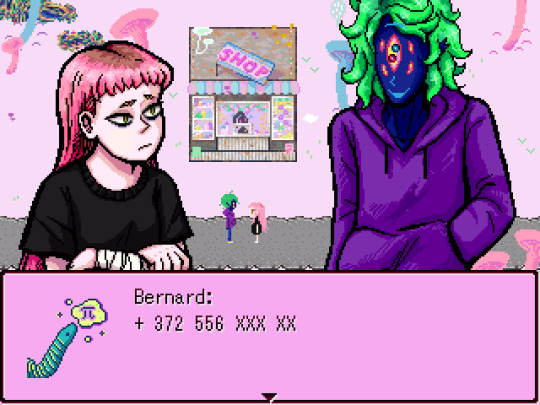
We mods would like to thank Shroomy for agreeing to our interview! We believe that featuring the developer and their creative process is just as important as featuring the final product. Hopefully this Q&A segment has been an entertaining and insightful experience for everyone involved!
Remember to check out Shroom Soup if you haven’t already! See you next month!
- Mods Gold & Platinum
#rpgmaker#indie games#pixel games#rpg maker#rpg maker 2000#shroom soup#gotm#game of the month#gotm august#august 2018#august#2018#interview#game making#game dev
832 notes
·
View notes
Text
6 games this year alone - post mortem
At the beginning of this year I made a plan to make 6 games in 2019, one being released every two months. My initial idea was that I use the first month to plan everything, and then use the second month to make everything, with the release happening on the last day of the second month.
I released two games this year under varying levels of success of hitting those deadlines: Saltwater Shells and Reach Out (and grab a hold of your goals). I was beginning to work on a Yume Nikki fangame for YNFG Jam, but I never finished it beyond a few early areas and messing with the tile design and minor animations.
The goal of this plan was to release more games than I had released in 2018, which was a grand ol total of 3. I was hoping, with giving myself deadlines that were not just like a week long jam, having 2 months would let me create something that was a little bit more thought out and well articulated.
Such is the nature of game design that I don’t think I really hit my goals all that much. I’m still happy with what I made to a certain extent, but the extraneous issues with the games and their release are what I think I need to work on.
Going chronologically, Saltwater Shells really tested my metal in the best of ways, and I’m pretty happy with a lot of it. I think I was overly ambitious but almost everything I set out to do is in that game. The only things that got cut was additional NPCs that you would’ve been able to interact with and give a little bit more narrative to the action of collecting sea shells. I think the game works without it, but that’s mostly everything I cut out from that game.
The release of Saltwater Shells was delayed by 10 days. A large bulk of the asset work for Saltwater Shells was done before then actually, it was just the final code that I was working on that needed to be in place so, you know, the game was actually playable. Also around that time was when I left my previous job and started at my new one. I had initially planned to be done with the game earlier since I was going to have a week off between jobs, but then it turned into just a weekend between jobs. I had to travel to Wisconsin, got a really terrible cold the day I traveled, and then travel back over the course of 3 days. I was still sick at my new job when I started it too and it was a lot of things to juggle really quickly and I still wasn’t done with the game.
Saltwater Shells still released though. I’m really happy about that. But the deadlines ended up being something that I kept having problems with. This ends up being a recurring issue, if you could believe it.
The second game was Reach Out (and grab ahold of your goals). I planned it from the start to be a crane game style game, and maybe a little bit more depressing in terms of your inability to accomplish life necessary things due to executive dysfunction or what have you. I also tried using Construct3 for the first time. So it was a learning curve of getting used to a new engine, as well as trying to pull off my plan. I used Construct3 because I really hate coding guys. Like I really hate it. I will code because I have to and I have the skills to do it, but if there’s one thing I would love to not do for the rest of my life, it would be coding. I experimented with trying to use a couple of other engines for this game, but what appeals to me about Construct was it’s pretty painless 2D physics, something that really trips me up in Unity constantly.
Being able to make a crane game was really rewarding, but really difficult turns out. This game ended up being delayed by 10 days from its original April 30th planned release date. I was really hoping to be able to get the game out on time this time, but I got sick again, and the physics method I was using was literally breaking everything or made the game unplayable.
The way Reach Out looks now is cut down significantly from where it originally stood. There was going to be at least 5 more levels and different goals per level of the crane game. There was also going to be a better method of gamifying your energy score vs. what it exists as now. I just ran out of time again.
I didn’t make any other games after that. My Yume Nikki fangame was going somewhere, but I got occupied with playing a lot of dungeons and dragons, and even wrote my own campaign. I didn’t get very far, but I liked what I had made but my energy to make games was waning after Reach Out.
I don’t like Reach Out as a game. I like the crane game part of it, because I love crane games. But it just serves as a grim reminder of my own inability to take care of myself, ironically, something the game tries to promote. My mental health went to hell before Reach Out came out and I don’t know if I’ve really recovered from the headspace I put myself in trying to finish that game. I really hurt myself mentally and physically trying to produce something that I knew was the antithesis of the product I was creating. I hate lying and dishonesty more than anything and I was being entirely dishonest with myself and my audience putting it out there under the conditions it was created in.
Promises and deadlines are the enemy to my success I think in a lot of ways. I really hate putting deadlines on things, for some reason time sensitive activities have always driven my anxiety up a wall that paralyze me. “How did you survive school?” a lot of procrastination and likewise bad mental health places. I put a lot of pressure on myself, and I think self-imposed deadlines hurt me much more than those others assign to me.
Knowing myself and my limits, I don’t want to think that this project was some kind of self flagellation, trying to push myself into a bad crunch corner that games so often perpetuate just to meet a deadline. I did QA for games, and crunch fucking sucks. I do QA for a photography company now, and crunch still fucking sucks.
The worst part about all of this is that I've been trying to write more scripts for games, I’ve been trying to learn how to use ren’py and some other game engines I’ve come across. I want to make games because I still really love them, but there’s like some kind of negative spike in the back of my head that doesn’t want me to make another game right now.
I’ve been taking a break the past couple of months from feeling pressured to create something, I have been chilling, drawing stuff for dnd, reading sherlock holmes stories, and watching a lot of youtube videos. I’m trying not to think about it and let myself recover from… some kind of hell I created for myself.
This post-mortem kind of sucks because all it really shows is that I learned I can’t beat myself and should try to work within my limits. I think that’s valuable but I really want to make a game right now. Anyway, I’m writing it also as a way to explain what’s been going on in my head lately surrounding making games. Games are fun and I’m glad you guys all like the weird ones I’ve made. I hope when I post a new one you all will enjoy it.
thanks for being here. I’ll be back when I’m ready.
#feel free to read this#its kind of an update but also a post mortem on the first part of this year for me#6 games this year alone plan
5 notes
·
View notes
Text
12/27/21
Wow today was a terrible day. I think it had to be the worst day I've ever had lol. Being around some people is so stressful for me and I don’t even know why. It feels like walking on eggshells talking to certain people LOL.
Today I was downloading touhou on my new laptop and at first it didn’t run at all. I got worried so I searched up why, just ended up being something that I needed to download from another website so that was ok, until I ran the game and the frame rate was super slow. Like 20 fps (if you’ve never played touhou before, the usual frame rate for the games is 60 fps) So I started getting really stressed and almost cried, because touhous really dear to me and it was the only thing I was looking forward to doing. Playing it.
For reference I was playing touhou 6
But i’m not sure if that matters LOL
However I played it today and It made me really happy. I love touhou. My favorite game has to be 7 because of its amazing atmosphere and the music and setting and story. No other mainline touhou game tops it in my opinion. I’m glad touhou exists. It gives my life a lot of meaning, even if that sounds kinda sad. It gives me motivation, because I know its really hard to get the extra stage boss so I wanna get it one day. Even if I know who the secret boss is. I could train to get it all day, I don’t care.
Anyways still a shitty day, don’t like living here at all LOL I need a vaycay or something, something to clear my mind and get away from this suffocating industrial hot ass city. I hope one day I live somewhere rural and peaceful that would be nice but I feel like that would become really unhealthy? I guess
Anyways I hope tomorrow is better. Im gonna play some more games to clear my mind or listen to some music. Playing yume nikki always clears my mind
Although I kinda wanna draw but I cant connect my tablet to my laptop at the moment...Kinda sad lol.
Whatever I will just draw later traditionally. Thats all I have to talk about today. Sweet dreams!
0 notes
Photo


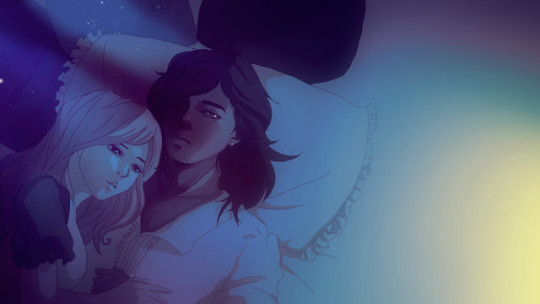

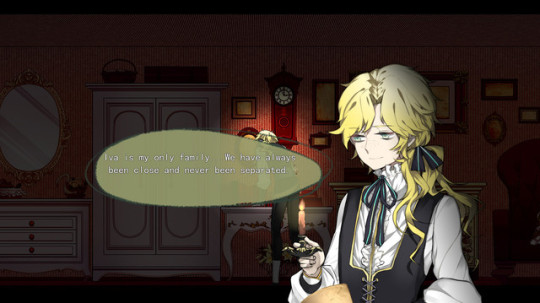

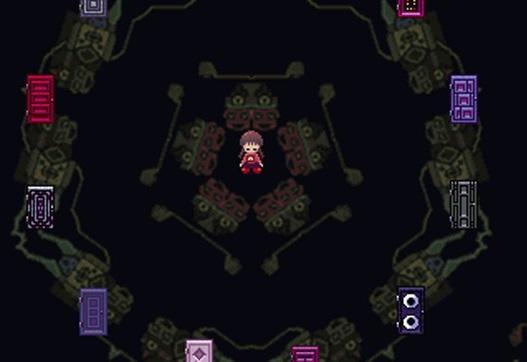


Three free games on Steam, part one
Over the last few weeks, I’ve been scouring the Steam store for free stuff. And by free, I don’t mean free-to-play online games like DOTA or Smite, which are all well and good and certainly deserve their place on the world’s most ubiquitous online storefront, but rather the weirder, experimental indies that exist within the cracks. I was inspired to do this by the trippiness of Doki Doki Literature Club, which I wrote about a few weeks ago. Doki Doki is certainly one of the most interesting projects on Steam that managed to spawn quite the considerable fanbase, all without charging a cent, and I noticed that if you take a deep dive, there are a few similar games out there also worthy of notice. Not all of them are great, but they’re all at least interesting, much in the same way that short stories and student movies are. Many of them are also text-heavy games with the same dark flavor as Doki Doki Literature Club, probably because the visual novel and horror genres mesh well with these small, self-contained free projects. Anyway, here are my quickie impressions on three of the ones I’ve tried out so far.
Cupid - I really enjoyed this one, and I’m quite surprised that it’s free. If Doki Doki Literature Club is a visual novel that plays on anime harem tropes and then subverts them by going down the path of psychological horror, Cupid is a visual novel that’s also filled with unnerving moments, but more rooted in a dark Gothic sensibility. You play as an 18th century French girl named Rosa who’s grown up under the guidance of an abusive mother and has quite a lot of issues to work through, including crippling self-doubt and a tendency towards self-mutilation. After becoming an orphan, she falls in with a young piano prodigy named Catherine who’s being sponsored by a strange nobleman named Guilleme. Eventually, a death occurs, and we learn that Guilleme isn’t exactly what he appears to be - and the nuances of his reveal actually make him one of the most interesting characters I’ve seen in a game in recent memory.
I’m perhaps not the target audience for Cupid, since in some of the unlockable development notes, the creator states that she catered towards the needs of queer female players and straight female players who wanted to question their sexuality first. But I can enjoy an intriguing story as well as anyone, and Cupid ended up addressing the nuances of love in a mature manner that really impressed me. And when I say love, I don’t just mean romantic or sexual love, though there’s at least one (very well-written) sex scene along the way - Cupid also deals with parental love, the love between friends and the love that one can have for life. There’s not too much online about the main creator behind this game - all I can find is that she’s an illustrator in Asia and has a team website here - but she wrote a compelling script that reminded me a bit of a cross between Dracula and Fingersmith, a novel and BBC serial from 2005 that I watched with an ex a few years ago and enjoyed. Pretty unique combination, really.
PRICE - This one’s an “escape the room” horror game that kinda feels like something you might find on a Flash website, but it certainly has higher production values. You play as a Dane (or German?) guy named Ivry who wakes up in his sister’s room and has to get out, and he just might not be alone in there. It was made by a tiny Chinese team, and the voice acting and sound design is surprisingly great at creating some spooky vibes. It’s even got some degree of replay value, since you unlock a second area after you beat it the first time, and the true ending doesn’t become accessible until then.
The gameplay’s of the point ‘n click variety, and it’s a tad hit and miss since the game is very dark and it’s not always clear what you can interact with and what you can’t. The story’s also something of a mixed bag - it’s certainly got great style, but at times it feels like a mish-mash of random concepts borrowed from shoujo and horror manga that the creators thought were “cool,” ie - a brother and sister who are a little too close, a flowery European setting, and lots of macabre paintings featuring skeletons and other vaguely devilish characters. There are some references to Hans Christian Anderson that caught me by surprise, though, and the game is great deal better than an actual escape room that I recently went to in real life, so there’s that!
Yume Nikki - Yume Nikki (the title translates to Dream Diary) might be the most well-known game on here, since it’s one of the more famous projects to be created with RPG Maker 2003. It first came out in 2004, and was actually one of those rare indie gems that accumulated a substantial following in the days before indie games were mainstream. In the years since, it’s inspired light novels, lots of comparisons to Earthbound and Undertale, and quite a bit of speculation on who its mysterious creator, known only as “kikiyama,” actually is. (It’s a secret to everybody!) When it was released for free on Steam a few weeks ago the reviews quickly shot up into the very positive range, largely thanks to old devotees gushing about how they’d loved it when it had first come out. Later, it was revealed that the game’s release predated a remake/semi-sequel of sorts that is decidedly not getting the same glowing reception, so it’s clear that the original Yume Nikki means a lot to quite a few people.
For me, someone who didn’t experience the game upon immediate release, this one falls squarely into the “interesting, but I’m not sure if it’s for me” range. All you do is control a little girl who’s wandering around surreal dreamscapes, and the experience is meant to communicate the strange and often horrific nature of the things our minds create when we’re asleep. It’s purely about exploring and drawing your own conclusions about the stuff you see around you, and while I can appreciate the intent here, the actual execution left me a little bored. I guess I’m one of those people who just likes to do stuff in games, though I can see how a moody exercise in wandering around and occasionally encountering frightening imagery might be appealing to some people. It’s certainly impressive considering the limitations of RPG Maker 2003, and I have a feeling I might’ve enjoyed Yume Nikki more if I’d first played it in 2004, as an impressionable 16-year-old who was also messing around with RPG Maker and had more time on his hands to simply explore.
I’ve got a few other free titles queued up, including a game styled like a 16-bit RPG that tells the story of a Syrian refugee, and will likely write a part two to this post once I’ve worked my way through them. Overall, it’s an oddly enjoyable experience investigating the often unnoticed free section of the Steam storefront. It feels like getting a glimpse into an underground subculture, or at least like attending a university’s niche film club weekly gathering. (Actually, it’s better than the one time I did attend my college’s niche film club. I nearly fell asleep watching Death in Venice, ugh.)
Screenshots all taken from each game’s respective Steam page.
26 notes
·
View notes
Text
signal jamming
incoherency is comforting because of the narrative weve been fed our whole entire lives that in order to be palatable media must in some way be complete and have beveled, well-defined edges rather than being a mess of finger paints, bright colors, strange dialogues and verbiage, build trees of moods.
thoughts on:
-futuristic anime, 90s anime and the unique sense of mood in toonami shows. they are a very good series of shows for people who are coming of age and who must slowly be forced to reckon with the industrialization and mercenary nature of adult life, as it is increasingly held captive by capitalism. there is also something essentially spiritual about it, especially shows like precure and dbz, where an interior or exterior-made-interior force is responsible for the protagonists' success in the face of an oppressive world-system. under capitalism, it frequently is the case that the entire world or entirety-of-world is against us. heroes must overcome overwhelming odds to leave their mark on a gauntlet of greats.
-cowboy bebop, final fantasy 7, metroid as meditations on loss, urbanization, dating back to blade runner. this is a type of meditation that is present in much of cyberpunk, but its also not exclusively cyberpunk, and can extend in nature to non-cyberpunk works.
thinking about necrobarista and how its attempting to "resuscitate" anime, while this approach doesnt really examine what contemporary anime like jojos, precure, and slightly more dated anime like hidaske and nichijou do well. if we get all this tunnel vision for gurren lagann and flcl we can never look forward. i think a lot of the visual work that needs to be done is probably in movies. i think maybe there could be work done to marry cinema proper with its animated counterpart. steven universe seems like it gets it, and there are some anime that really seemed like they got it. i dont think were beyond salvation.
-listening to the whos "tommy" and thinking about how trauma and the humanity of that trauma is experienced and lived-through by the main character in socratic fashion. these stories are discussed by people whose actual, authentic experience of trauma irl is doubtful at best. they are great successes on stage who dont struggle in the sense that an actual victim would struggle. calls to mind how a lot of freuds patients would fabricate csa in order to fulfill the expectations of the therapist. but in other cases, actual patients with csa would repress their experiences or not feel comfortable discussing. so thats how i feel about gurus like meher baba or i guess alan watts. less trustworthy and more like scam artists. i do believe in what they teach, however. i think that a guru can teach the truth even if that guru is a liar. maybe its the truth, but the guru doesnt know it to be true, or else, the way the guru teaches it is untrue.
-for a while i imagined my own autism to be the result of childhood trauma that was repressed, but later emerged that those memories were fabricated, to my knowledge, and was left wondering.
-learning to regard the world with a sense of wonder from media like cowboy bebop and ff7. these worlds are jaded and decaying realities but there is a sense of awe at the vast, uncompromising reality. truly vast, sprawling and yawning cities and vast starry skies up above. beholding these things and beholding the starry skies and huge cities of our own planet surely stirs something in me.
-fantasy anime tends to go the joke route like slayers or else the route of "we are all kids, bro, stuck in an mmo" and i think this is mostly due to the admittedly antiquated setting of high fantasy in european trochets and history which to japanese people probably feel like white person set dressing and as they should, i mean. there are more high fantasy themes in something like inuyasha and japans history can be feudal, edo, the meiji restoration, primordial like princess mononoke, etc, so theres more wiggle room for historical works there. slayers et al is usually reduced to "characters moving around the forest" which is almost like this grand slice of the collective anime consciousness as it stands overlapping with, say, pokemon, to the extent where its one of the cliche anime things everyone thinks about, alongside high school, robots, nurses, etc.
-another thing to which we could probably ascribe the success of something like slayers to is wizardry and by proxy dragon quest. small graph paper monster garden games. the appeal is entirely mathematical so there are only a few directions that anime directors tend to run with it (goofy gag comedy if youre making a show or cut and dried authentic dungeon crawlers with moe characters instead of the usual dbz ones). going off what you definitely learn in japanese history class if youre a japanese student, for starters, there are thousands of years of chinese history, so you have romance of 3 kingdoms type stuff. or you have high school romances accounting for the various fire emblems where the appeal becomes game of thronesy "which of my characters in dragon quest land can i make kiss each other and myself", very good ground to cover as we start asking the important questions. theres samurai stuff as we already know, drawing on years of samurai media, kurosawas films and zen spirituality, art of the blade type stuff, jeet kune do in some instances and reaching so far afield as to probably raise some interesting and important questions about pan-asiatic cultural identity which this author (white) is ill-advised to answer. but reeling it back in, the question mostly being of history, and how a lot of fantasy media draws more from History proper as a codified cultural body than histories being individuated familial experiences. its true that when a work does something unique with history (earthbounds hippy dippy approach to the 1960s, undertales handling of furry culture, yume nikkis south american murals) its tended to be seen as that works "thing" as if because hulk hogan was an all american wrestler that precluded john cena from being same, or at least, embodying a similar if slightly modified niche. nobody can make a hippy dippy rpg now or something because itd just be called an earthbound ripoff rather than a loving homage. and i think thats wrong headed and how genres become stillborn rather than invented and developed upon. we have this vast morass of stuff from the 20th century and we could be developing various 60s, 70s, 80s fantasies. hindsight is 20/20 i guess. who knows, we could see bluff city become something in 50 years time.
i feel this is because of extreme stringent expectations of intellectual property laws and their dissemination into everyday discourse online. i dont really like or agree with monolithic cultural expectations like intellectual property or *shudder* advertising, but only to the extent where i can acknowledge that whether or not i agree with them is irrelevant to their all-consuming scope and the need for marxists to actively combat them. its one thing to say "x is bad" and another to clamor for urgency of fighting x, which is, if you believe what we read every day about global warming, too late, so its not important. nevertheless there are a multiplicity of settings that could be developed into genres and identities and ideologues that rarely are if only because it would be seen as "oh yeah like that other thing". people are fickle and develop dwarflike strange moods when it comes to defining what constitutes original versus hackneyed and derivative. i think its mostly dictated by star signs and the weather.
so lately if you follow me on twitter youve probably noticed im doing sort of a tweet concrete kind of thing where i post plaintext quotes from various media taken out of context. i decided to do this for a while, maybe a few weeks, because aesthetic blogs and the aesthetic style of blogging allow me to pool and channel my energies towards larger and more ambitious styles of writing. i usually get loaded on caffeine during this process and frequently watch large amounts of anime and meditate some. its definitely a process and its geared toward something hazily, vaguely spiritual but with pretentions toward being authentically publishable as theory. the idea also being i would like to make some money to support my livelihood, and i like to write, and am somewhat skilled at it, or at least experienced in kind of a ramshackle homespun sort of way. so if my social media presence is pretty boring and kind of weirdly nostalgic or else contrariwise if you feel it has improved lately thats the reason why that happened.
ive been getting very hazy and foggy mentally lately. i feel like it has to do with caffeination and lack of sleep. its important to get everything flowing properly, and sometimes depression and anxiety make that difficult to do. theres anxiety over unemployment, something im trying to remedy, and theres anxiety over theory and where to proceed next via theory. for years i was a devout buddhist in some ways, and meditated a lot, almost every day. i prayed to the bodhisattvas and copped to buddhist metaphysics, something which, based around personal life experience, i had every reason to believe was true. lately and in my own, strange way, ive begun to question this ideology and interpret it as part of a patchwork of ideologies, each one which attempts to describe a totality, a totality which is rarely if ever described properly by any ideology. grasping at straws in a structural sense, and feeling nonplussed but with no ground to run to, and im back on the boss level in super mario 64 where bowser smashes the ground to make it fall away. attempts at restructuring as this dissolution transpires only serve to create new protocols equal in scope to pre-existing paradigms. and there are plenty of people who dont struggle this much with religion and probably still go to heaven, or think theyre going to heaven, or something. hows marge and the kids. did jerry get that new promotion. mom just got back from vacation in cancun. smalltalk style concerns arising in every day transitionary speech feel distinct and very distant from these kind of hazy, pie in the sky questions. plato never wrote about the kind of stuff you see in a cheers episode. there are philosophy books that try to merge the two, but they usually get shelved in the comedy section.
so its mostly a matter of trying to absorb and contain new information, which abides in abundance, and trying to corral it into sort of a pointing arrow to direct me where to go, in my hewing, a feat not easily done. probably the endgame is in the crafting and solution of art, but what kind of art, and whether i have the tools at my disposal to even create it, is less easily answered. so for now, i guess, im absorbing, waiting, asking questions, and who knows, and who can say.
earliest memories of religion are of the greco roman religion and not knowing about the mystery religious rites but knowing about an abstract concept of wisdom and the ocean and extrapolating the existence of athena and poseidon in that way. later i have memories of exposure to christianity and buddhism and bahai but none of these things feel particularly useful to me at this time in my life. i can more readily receive a picture, a kind of enlarged image, of a broad religious landscape and some of the questions it attempts to provide answers for, or at least, a way of thinking about. the greco roman religion, for instance, is a presentation of a deleuzian multiplicity, and the monotheistic religions are a monad, but i also dont think either of these things can say the other is inherently undesireable. tolerance seems to be the best method, but also, and likewise, not dwelling specifically in any of them. acknowledging they all exist, but not being any of them. enjoying in surfeit the tension between multiplicity and monad. that there can be many things and one thing. like the album cover of dark side of the moon.
6 notes
·
View notes
Photo


Day 15 of yume nikki month: Daily life of an NPC. I find masada-sensei one of the most interesting NPCs mostly because he notices madotsuki and is one of the npcs to me looks like he cares about her. most people I have seen take this in a creepy way but I found it more charming and like a good bf or friend kinda thing then a creeper but I really pick up creeper vibs from things unless is spelled out in front of me See marty armstrong and the boar from dreaming maru. and because of hes eyes It makes me think of the cinnamon roll known as derpy hooves, so I see him as nice and kind. and not a creeper. but that is just me.see him how ever you want. but of the things in the game I see him on team good. I do admit any npc can be interpreted as a good guy or creeper and anything in between and that's OK Like I see the Aztec Rave monkey as a good guy, but I've seen just as many arguments if not more saying that he is a creep so pretty much anything interpretation is right and wrong at the same time. I just see most of the cash is not bad guys or rapist or evil. Oh and I want to draw Mars-san more. I like the idea of making its dots of color be stars!
I also changed the ending to be sweeter. I had the idea of it ending by mado stabbing him and him waking up in the next dream like nothing happened but I feel him being stabbed is over done. but I felt it was over done. you live another day star man!
8 notes
·
View notes